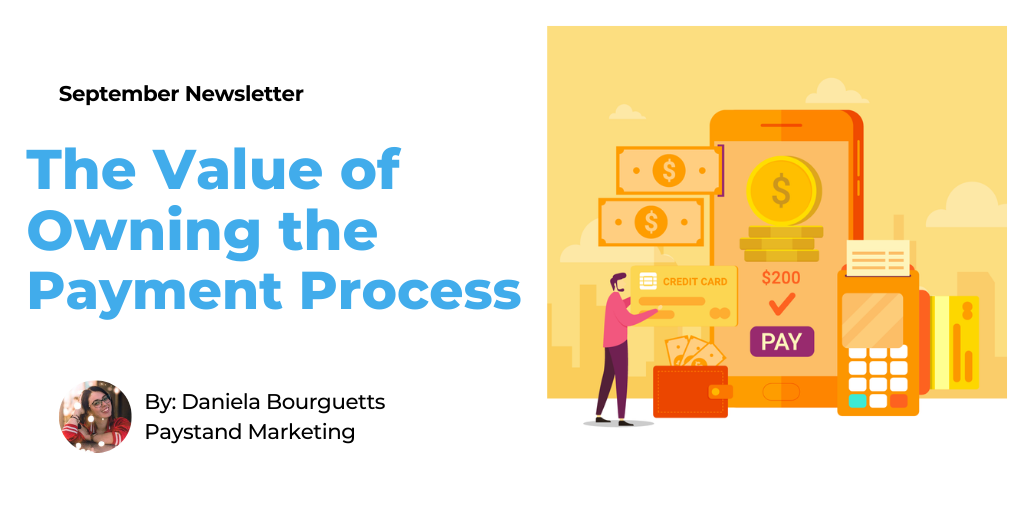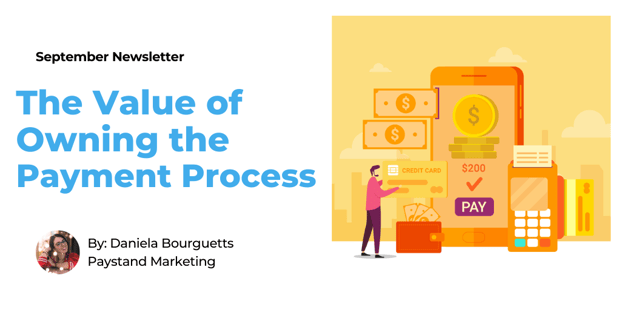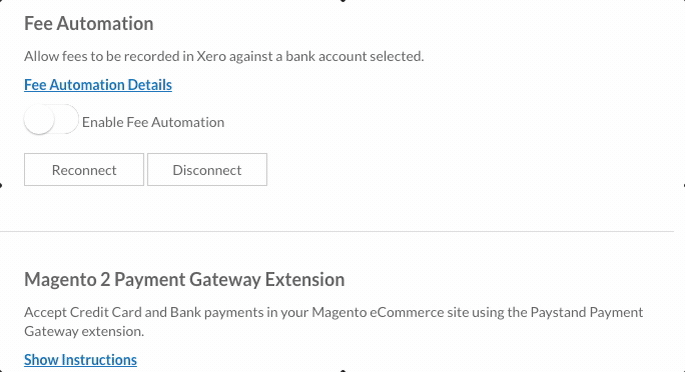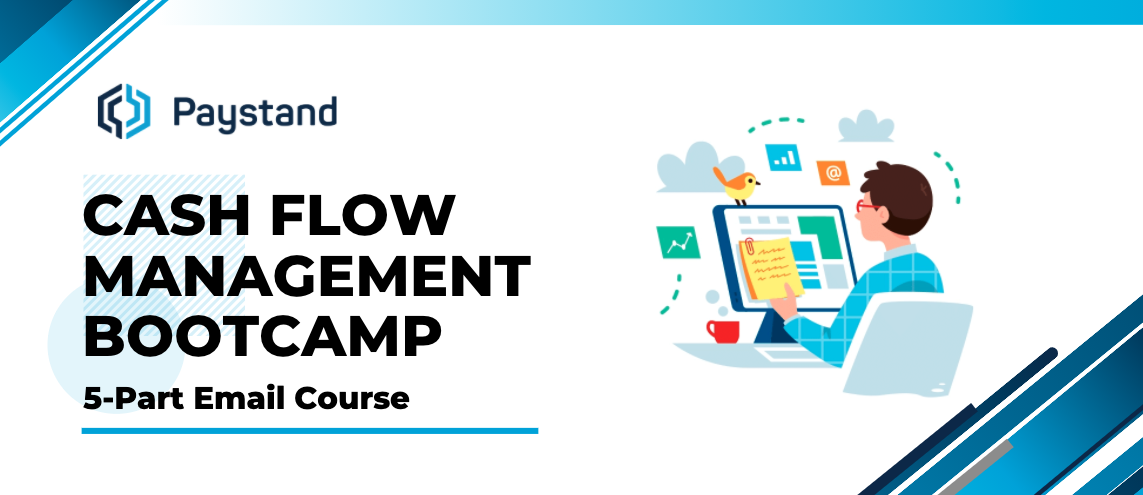Issue #06: The Value of Owning the Payment Process


Editor’s note: Hey there, my name is Daniela. I'm the new editor of Paystand's monthly newsletter. After a great start and five issues, Sarah is passing the torch. But don't worry, you're in great hands. I'll still be sending you a roundup of the best payments and finance content from Paystand and around the web, every month. Don't miss the next issue. Subscribe now.
The history of payments has a clear through-line. Merchants are expected to pay a never-ending list of fees for accepting payment from their customers.
There’s a fee for banks, a fee for the payment networks, and over 300 other fees businesses have to pay with the expectation that they will operate more efficiently. In fact, in October interchange rates are set to bump up again as the card networks reset fees. And so, the never-ending cycle of fee increases for merchants marches on.
But when does it stop being good business to outsource payment processing and start becoming a risk to your revenue?
In today's issue, we explore why market leaders are bringing payment processing in-house. Hint: there are several revenue implications that give businesses competitive advantages that are achievable in no other way.
- The Value of Owning the Payments Process
- Product updates
- What we're reading
- Noteworthy tweets
- Free Cash Flow Bootcamp Course
The Value of Owning the Payments Process
Not too long ago, it was good business to give up a percentage of every transaction to payment processors and card networks. They made it easier for businesses to get paid, updated the technology, handled all the background work and took on the lion's share of risk for every transaction they cleared.
The relationship was "driven by the balance between the value merchants receive for accepting cards and the cost of products required to meet consumer expectations as cardholders."
But today, this fee-based approach to payment processing is hurting the businesses it's designed to help. Card networks and processors charge over 300 fees and increase their rates twice a year, making costs less predictable for merchants and stretching their margins thinner. And despite the fact that merchants are already on the hook for so many fees, now big tech companies like Google and Apple are looking to sneak in their own fees into the payments pie.
This is alarming. Consider this: Apple and Epic Games are at war right now because the latter brought payments in-house to avoid the massive 30% fee Apple takes on all purchases made on apps available through the iPhone. What does it say about our financial system when you have to be a multi-billion-dollar game developer just to push back against high transaction fees?
That's why owning the payment experience has become a priority for many market leaders. When you own the payment experience, these problems solve themselves and open up ways to better serve and retain customers while driving more margin.
Shopify is a prime example of the value of owning the payment process. First, it developed its own payment gateway, Shopify Pay, while also integrating other payment options. Then, it announced the launch of the Shopify Fulfillment Network so that merchants can use it to fulfill their orders. Once a merchant signs up for Shopify, their money bounces around the Shopify system resulting in more margin ending up on Shopify's balance sheet.
While the company was primarily a subscription revenue business at the onset, the business now derives the majority of its revenue from financial services.
That, in a nutshell, is the value of owning the payment process.
Product updates:
We're always working to upgrade the payment experience for our merchants, large and small. Here are some recent updates that we've made to Paystand.
✨ What's New 🚀
- Fee automation for Xero users: Automating the way you manage transactions adds efficiency to your accounts receivable process, reducing the stress and hassle of manually customizing how each customer payment is handled. With our fee automation setting, merchants can now control, schedule, and track how payment fees are collected in Xero. Learn more.

- Cash Sales support for NetSuite: Now merchants can accept payments on sales orders via cash sales in NetSuite. Previously, sales orders in NetSuite could only be paid via customer deposits. While this works for accrual-based companies, it's not an ideal process for cash-based businesses. T
his supports the use case where a customer orders, receives a purchased good or service, and immediately pays for the goods and services received. NetSuite Credit Card Processing. - More control over customer onboarding. Our latest API improvement is all about reducing friction during customer onboarding. With this release, software platforms can use our APIs to quickly identify what information still needs to be collected from their customers. Learn more.
✨ Polishes & Fixes 🚀
We've also added several new fixes so it's easier to:
- ✅ Reduce hold times on payments made over the weekend
- ✅ Control who pays the transaction fee on recurring payments
- ✅ Onboard businesses on to more than one platform
- ✅ Retrieve a customer balance via our API
What we're reading 📚
- Monetize Your Payments: B2B Edition. Businesses no longer need to give payment processors 2%-3% of their sales just to facilitate transactions. In this podcast, Paystand's Kris Riley explains how owning the payment experience gives companies the ability to earn more revenue, offer new services, and significantly reduce the cost of payment processing and accounts receivable management for your business.
- Leaders in Payments: Paystand's Jeremy Almond. As the industry continues to move away from fee-based payments, many payment processors are rethinking their business model and services from top to bottom. Some experts are wary that fee-less transactions will ever become a reality, but Paystand has been moving money without charging fees for years. In this podcast, our CEO Jeremy Almond explains why Paystand's Payments-as-a-Service model makes payments more efficient, cost-effective, and scalable for B2B businesses.
- Pandemic Fuels Growth in B2B Payment Sector. COVID-19 has forced significant and swift changes to many business processes, none more so than payments infrastructure. FinLedger details several companies at the forefront of the mass digitization of payments in B2B.
- Visa, Mastercard Debit Fees Are Hurting Retailers, Sen. Richard Durbin Says. In the face of the pandemic, online and virtual commerce has become the new status quo. It's one of the few actions companies can take these days to stay in business. As more people than ever switch to online payments, credit card networks have decided to make those transactions costlier to process, and merchants aren't the only ones taking notice. This US senator argues retailers and restaurants cannot afford to pay unnecessarily high fees any longer.
Noteworthy Tweets 💬
Finance Leadership: Companies that have navigated this pandemic through periods of high growth all have one thing in common — they're embracing new tools and automation before the old systems break. Case in point: digital transformation.
Too many businesses put it off for years because they saw the changes as "good to have" vs. "absolute must". Now, these businesses are paying 10x what they saved last year by pushing these technology investments off.
#COVID19 has prompted a major swift to touchless payments in the healthcare industry. @jeremyalmond, CEO of @paystand, shares his perspective on healthcare's digital infrastructure with @EllenYChang of @FinLedgerNews https://t.co/j1iVynZEQh
— BAM (@BAMtheagency) September 4, 2020
Milestone: We started Paystand with the simple idea to do something radically better in payments, using cloud and blockchain technology to redefine how businesses send and receive money. Our investors made a huge bet that businesses wanted more out of payment processors. By moving beyond payment processing, we've raised the bar by lowering the costs, overhauling the quality, and giving businesses greater control over their revenue.
With 1007% growth, I think it's safe to say they made the right call. 😉 Thank you, Cervin Ventures!
Perseverance + Product Market Fit + Network Effect = Magic! Congrats to our portfolio company @paystand on all the amazing things it has achieved this year! https://t.co/ajNIqJAc4Y
— Cervin Ventures (@cervinventures) August 20, 2020
Financial Technology: SaaS + Fintech = more revenue, more margin, less churn. Owning the payment experience isn't just good for traditional businesses, it's also invaluable for startups and marketplaces too. It makes for huge savings in fees while providing several new ways to generate revenue and increase ACV for your business.
Check out this thread by A16z venture partner Angela Strange.
4/ FinTech goes far beyond payments - vertical software companies should consider lending, cards, insurance, bank accounts, compliance, payroll & benefits pic.twitter.com/kqfTSBIrh6
— angela strange (@astrange) August 4, 2020
Payment Processing: Paying costly transaction fees might have been the way to accept payments quicker and easier in the past, but it's certainly not the best option anymore. Just the most expensive one, if we're being honest.
Obvious opinion worth repeating:
— Rex Salisbury (@rexsalisbury) September 3, 2020
Fees for instant payments (and non instant) are too high.
As a result consumers suffer, innovation stalls, and incumbents benefit.
NEW! Cash Flow Management Bootcamp

Cash flow problems can take down businesses that might otherwise be profitable according to accounting standards. A weak cash flow position can compromise your business' ability to pay suppliers on time or settle debts from accumulating bills — leading to additional late payment fees.
This can both sink your credit rating and damage your relationship with customers, landlords, utility providers, and suppliers.
We put together a 5-part email course to give you actionable tips and strategies you can use to unlock cash flow from your accounts receivable process and build a sustainable process that scales.
Sign up our free Cash Flow Management Bootcamp.





